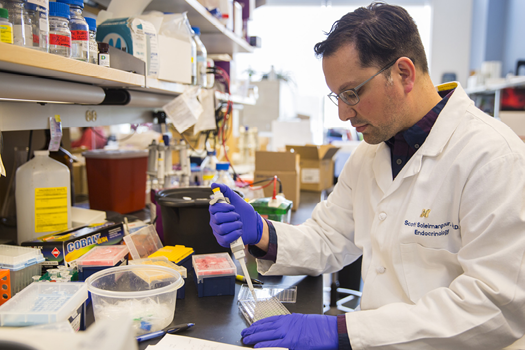The Michigan Medicine Diabetes Transition Program supports pediatric patients successfully transition to adult care. Children living with diabetes rely primarily on their parents or guardians, and often have myriad resources available to assist with managing their symptoms as they grow and develop. However, between the ages of 18-23, when they are ready to move on from pediatric care providers (sometimes a physician or team that they have known since their diagnosis) to adult care, it can leave a critical gap in care and guidance.
At Michigan Medicine, we are working to help alleviate some of the ancillary fears and uncertainties that may be present at a critical time in their lives. The Metabolism, Endocrinology & Diabetes faculty involved in the program include Lynn Ang, MD, Jennifer Iyengar, MD, Jennifer Wyckoff, MD, and Scott Soleimanpour, MD.

"It’s important for diabetics to empower themselves. You can’t be a backseat driver with your diabetes." - Dr. Scott Soleimanpour
How does the program support this transition?
The Diabetes Transition Program team at Michigan Medicine, overseen by Scott Soleimanpour, MD, Associate Professor of Internal Medicine in the Division of Metabolism, Endocrinology & Diabetes (MEND), recognizes that for this unique population of patients to live their healthiest lives independently, they must have information, resources, and support. As a Type 1 diabetic himself, Dr. Soleimanpour brings his passion and personal background (in addition to his own transition experience) to bear to focus on improving care for young adults with diabetes. As one of few structured pediatric-to-adult care transition programs for patients with diabetes, we are passionate about helping patients be successful.
Patients and their families can participate in one of several group sessions per year scheduled by the program coordinator, a diabetes social worker who has extensive expertise with transition patients. Our diabetes education specialists talk them through managing diabetes care on their own for the first time. This includes navigating insurance calls, proper insulin storage, co-pays, and healthy meal choices, especially on a college campus or away from home. For patients going away to college, there is referral assistance as well. This basic information is critical to safely and comfortably self-managing.
Why is this program important?
With diabetes, the well-known complications of poor blood sugar control, such as blindness, kidney failure, and numbness in limbs, do not usually manifest until 20-30 years after diagnosis. Our team works to see that our patients get the continuity of care needed to not fall through the cracks and experience a major health crisis years later.
What are the program's goals?
The Diabetes Transition Program has gained remarkable momentum. Thanks to seed funding from a family with a shared commitment, we’ve built a foundation that has great promise. While we have already begun collecting preliminary data to track participants’ progress and consistency in self-care, as well as monitor the onset of diabetes distress, we need a full-time team that has autonomy of time for more outreach and to pursue these goals. Funding for longitudinal research will enable us to follow patients for longer periods of time, outside of the clinic where the effectiveness of the program is tested and challenged daily. We will employ that data to assess how diabetes distress changes patients’ overall outlook, care and behavior; how frequently it occurs; and, if the transition program allays their concerns.
In the News/Media
- Dr. Soleimanpour at the 2018 Juvenile Diabetes Research Foundation (JDRF) Annual Meeting - Video, June 2018
- 15 Things Diabetes Doctors Do to Keep Their Own Blood Sugar Under Control - Reader's Digest, February 2018
- Type 1 Diabetes - Second Opinion, November 2017
- How Close Is a Cure for Diabetes - WDIV ClickOnDetroit, September 2017
- 5 Questions with a Diabetes Physician Who Has Type 1 - Michigan Medicine Health Blog, June 2016
- Genetic Risk for Type 1 Diabetes Driven by Faulty Cell Recycling - Michigan Medicine News, June 2014
How to Donate
The potential to change the course of care for these young people is limitless. Your investment in the Diabetes Transition Program will help them comfortably and successfully assume responsibility for their long-term health. Together, we can empower them with necessary knowledge and support, and dive deeper into their needs and patterns to improve outcomes as they move through the next stages of their lives. To make a gift, please visit the Anthony Family Type I Diabetes Transition Fund online giving page.
Please contact Andrea LaFave if you have any questions or need help making a gift.
Andrea LaFave
Associate Director of Development
Phone: 734-763-6173
Email: [email protected]



